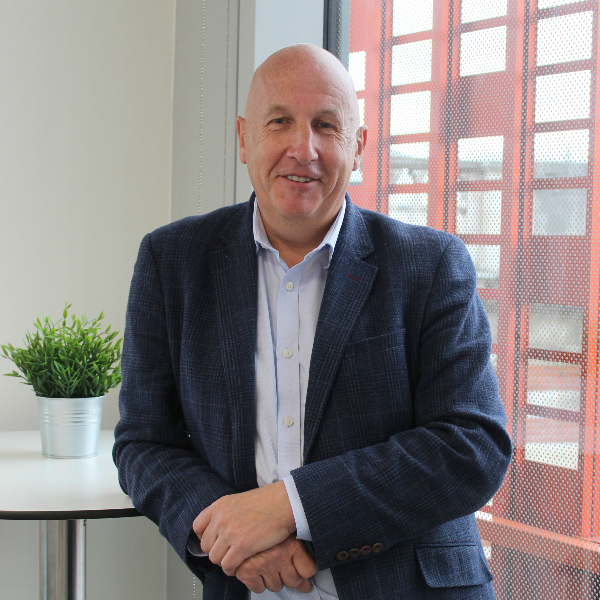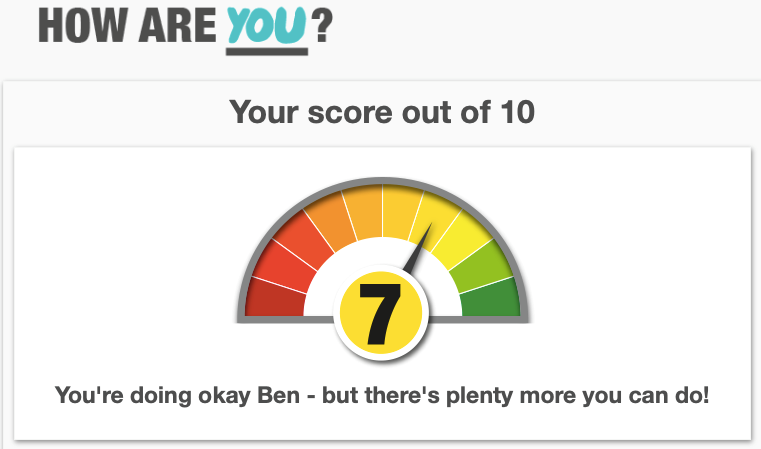Professor Ben Bridgewater: What have I learned on my digital health empowerment challenge?

In his final blog of his personal health challenge series, our Chief Executive Professor Ben Bridgewater reflects on his health journey, what he has learned and the impact digital technology and tools can have in the future of healthcare.
This has been a successful period for me. I feel empowered by my use of technology, I feel happier, more relaxed and more fulfilled, and I have lost a stone to get very close to my target weight and reduce my risk of developing diabetes. I know my risk of developing the common killers of men in their 50s and 60s is not elevated above average, and I have taken some steps to reduce my risks further, both through weight loss and changes in diet. And all of this has cost me a princely sum of £14.99.
As I have been preparing this series of blogs it has approached the time for self-assessment tax returns – my financial affairs are not complex these days, and I had left my preparation woefully late, in fact until the last week of January. My internet banking had lapsed (I forgot all my passwords and could not get access) and was getting into a bit of a panic. I ended up with one phone call to the bank where I was able to be security checked by my voice ID and they sorted me out in real time with all necessary new security. I downloaded the new banking app and set it up with access now from my fingerprint scan. Within minutes I could download all necessary statements electronically and forward them all directly to my accountant. The whole process took about 20 minutes end to end. And I can now directly forward money in real time to my kids when they tell me they are the front of the queue in Starbucks with no money of their cards. This is the provision of products and services for the digital user in the modern age.
So, I compare this with my healthcare experiences over recent weeks, and the differences are huge.

My access to my GP has not been anything close to as straightforward as access to my bank – I tried to book an appointment with my GP over the phone (I fully accept some things in digital medicine are very complex but this really is a very simple transaction) to be told by the receptionist that my GP now works on Mondays and Fridays only and appointments are released five days in advance. To secure an appointment I need to phone up first thing in the morning on the day when the appointments are released.
I enquired about online booking, to be told that this is also possible under the same conditions, but that these appointments go very quickly. I still haven’t organised an appointment because I have not yet got my act together to book one of the few available slots.
In seeking out online products to assess and improve my health I have had to scan the internet using more than a small slice of medical knowledge, experience and judgement to find usable and credible apps that do not suck me into some subscription-based services or portals for buying related products. The NHS website has been useful to a point but does not go nearly as far I think I need, and local healthcare services are not even close to providing tools that a connected digital consumer would want.
The NHS long term plan does recognise this and talks optimistically about using technology to empower citizens to take control of their health and wellbeing, but there is a long way to go to make this reality. In our business at Health Innovation Manchester we talk about identifying health care problems and preparing the solutions to resolve them, and in our world solutions require changes in people, processes, culture, tools and technology.

I think this framework is particularly valid as we consider the problem of empowering people’s health with technology. Leaders of healthcare systems need to be much more active and expert in digitally transforming the products and services they offer, and processes need to be re-imagined rather than simply adding digital things into existing pathways.
The culture needs to change – and here I refer specifically to the culture of the medical profession and healthcare providers, and my perspective is based on experience of providing digital products to professionals and the public on the activity and outcomes of surgery, and having direct knowledge of the nature of professional and organisational backlash. Digital platforms disrupt existing value chains and this is usually uncomfortable for the existing status quo, and as any management consultant will tell you, culture eats strategy for breakfast.
As I have been putting together this series of blogs I have had a fair bit of feedback, most positive and some not so much, really saying that:
- It is OK for you because you are a doctor with IT interests – what about the people who really need this kind of support who do not have your background?
- Will you still be doing 10,000 steps and maintaining your target weight in 6 months’ time?
Both are valid questions.
Dealing with the latter, I recognise the challenge and there is no doubt that blogging publicly about your body mass index and committing to reducing it is a powerful personal motivator (and maybe the tip here for others is to deeply and transparently look into their own particular motivations). I used my calorie counting app religiously at first, but with a better idea of what I am eating and its implications and positive results from weight loss I have stopped putting the foods in now. I do however use the step counting app religiously as it is so easy, but I think the most important things I have done are the changes to my lifestyle; I enjoy these and am confident they will stick.
As for the first question, this is of course fundamental, and it is interesting to think for a moment about how the internet and technology is changing the way people live their lives. If we understand that better, we can plan enhanced healthcare and wellness products for the digital age. There are also sorts of theories and scare stories out there about the effects of technology, with some evidence that social media may be contributing to an increase in health problems, children’s mental illness for example.
I have tried to find some crisp information on how society is changing and more specifically what the implications are on society on populations’ interactions with healthcare services since the near ubiquitous use of smart phones. There is not as much conclusive research on this as I would have expected. There is no doubt that the internet enables the production, distribution and use of digitised information of all types (Hilbert and Lopez 2011), and that the vast majority of information existing on the planet is now accessible in a digital format.
Easy access to all to information at this scale must have an effect in its own right, for example the type of information and knowledge previously only available to professions is now available to anyone. But it has been difficult for me extracting the wheat from the chaff – I have had to travel the world (from the comfort of my office) to find the apps I have used, and certainly the current provision of health and wellness services in the NHS does not get close to doing this for me – the NHS website does a decent job of displaying information, but it does not enable me to interact in the way that I have done for my wellness and cancer assessments.

So in summary I think the most important thing that I have surfaced, which is by no means new, is that the current provision of products and services for healthcare and wellness gives a customer experience which lags way behind other industries. Existing offerings are dispersed and not effectively curated by healthcare providers to make a relatively simply task, such as the one I set myself six weeks ago, as easy as it should be in order to enable more men in their 50s to use technology to assess their risk of key diseases and take action to influence their outcomes.
Segmenting the population, defining their needs and then developing new portfolios of products and services powered by technology, seems to me to be the thing that should have increased focus – and there is nothing fundamentally different in health and wellness, compared to the things that have already happened across most industries.
We know that the degree of disruption of industries is determined by the relative maturity of digitisation and the degree of regulation – highly digitised and non-regulated industries are completely disrupted (such as music), and those which are highly regulated and still work predominantly on paper remain largely unchanged. Digital maturity is increasing in healthcare, and services are very regulated, but wellness care is unregulated which gives opportunity to make more rapid progress – and keeping people well and away from primary care and hospitals must be the right thing to do.


